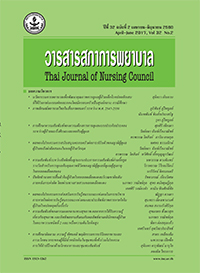ผลของโปรแกรมการสนับสนุนครอบครัวต่อการปรับตัวของญาติผู้ดูแลผู้ป่วยหลังผ่าตัดสมองในหอผู้ป่วยวิกฤต
Keywords:
การปรับตัว, โปรแกรมการสนับสนุนครอบครัว, ผู้ป่วยหลังผ่าตัดสมอง, ญาติผู้ดูแลหอผู้ป่วยวิกฤตประสาทศัลยศาสตร์, coping, family-empowering programme, postoperative neurosurgical patients, family caregivers, neurosurgical ICUAbstract
Abstract:
Objective: To compare the coping ability of family caregivers who participated
in the empowering programme and that of family caregivers who received standard care,
for three days during the patients’ treatment in the ICU.
Design: Two-group experimental research, with a pre-test and a post-test.
Methodology: The participants, 60 family caregivers of neurosurgical patients,
were equally divided into an experimental group and a control group. The data-collecting
instruments consisted of a family-empowering programme for family caregivers and a brief
COPE questionnaire. The data were analysed using Wilcoxon Signed-Rank Test and
Mann-Whitney U Test.
Results: After participating in the family-empowering programme, the experimental
group displayed signifcant improvement in their coping ability (p < 0.05). The experimental
group also showed signifcantly higher coping ability than the control group did (p < 0.05).
Participation in this programme gave the neurosurgical patients’ family caregivers signifcantly
improved ability to cope with the patients’ conditions.
Recommendations: It is suggested that this programme be applied by nurses to
providing care for neurosurgical patients from the beginning of their treatment, to help their
family caregivers cope more effciently with the situations facing their relatives in the ICU.
Downloads
References
2. Murrey GJ, Hale FM, Williams JD. Assessment of anosognosia in person with frontal lobe damage: clinical utility of the Mayo-Portland Adaptability Inventory (MPAI). Brain Inj2005;19(8):599-603.
3. Moreau. Critical care nursing made incredible easy. Philadelphia: Lippincott Williams & Wilkins; 2004
4. Kinrade T, Jackson AC, Tomnay JE. The psychosocial needs of families during critical illness: Comparison of nurses’ and family members’ perspectives. AJAN 2009;27(1):82-8.
5. Wartella JE, Auerbach SM, Ward KR. Emotional distress, coping and adjustment in family members of neuroscience intensive care unit patients. J Psychosom Res 2009;66:503-9.
6. Roy C. The Roy adaptation model. 3th ed. Upper Saddle River, New Jersey: Pearson; 2008.
7. Khiewchaum R, Thosingha O, Chayaput P, Utriyaprasit K. Coping with traumatic brain injury using the preparation program among caregivers of patients in the intensive care unit. SMJ 2011;63:128-31.
8. Lin PC, Lu CM. Psychosocial factors affecting hip fracture elder’s burden of care in Taiwan. JON 2007; 26(3):155
9. Maxwell K, Stuenkel D, Saylor C. Needs of family member of critically ill patients: A comparison of nurse and family perceptions. Heart Lung 2007; 36(5): 367-76.
10. Davison JE, Daly BJ, Brady NR, Higgins PA. Facilitated Sense making: a feasibility study for the provision of a family support program in the intensive care unit. Crit Care Nurs Q 2010;33:177–89.
11. Mahoney FI, Barthel D. Functional evaluation: the Barthel Index. Md Med J 1965;14:56-61.
12. Glass GV. Primary, secondary, andmeta-analysis of research. Educ Res 1976;5:3-8.
13. Cohen J. Statistical power analysis for the behavioral sciences. 2nd ed. New Jersey: Lawrence Earlbaum Associates; 1988.
14. Polit DF, Beck CT. Nursing research generating and assessing evidence for nursing practice. 8th ed. Philadelphia: Lippincott Williams & Wilkins; 2008.
15. Carver CS. You want to measure coping but your protocol’ too long: consider the brief cope. Int J Behav Med 1997;4:92-100.
16. Numdokmai S, Wacharasin C, Deoisres W. Effects of nursing intervention program based on Illness Belief Model on family caregivers’ stress and caring for stroke patients. The Journal of Faculty of Nursing Burapha University 2016;24(1):27-38. (In Thai)
17. Gaeeni M, Farahani MA, Seyedfatemi N, Mohammadi N. Informational support to family members of intensive care unit patients: the perspectives of families and nurses. Glob J Health Sci 2015;7(2):8-19.
18. Yotinwattanabumrung A, Ua-Kit N, Jitpanya C. The Effect of family crisis intervention program on adaptation of family mMembers of patients admitted in an intensive unit. Journal of Nursing Science Chulalongkorn University 2007;19(2):98-111. (In Thai)
19. Huang TT, Peng JM. Role adaptation of family caregivers for ventilator-dependent patients: Transition from respiratory care ward to home. J Clin Nurs 2010; 19:1686-94.
20. Lundberg PC, Kerdonfag P. Spiritual care provided by Thai nurses in intensive care units. J Clin Nurs 2010;19:1121-28.








